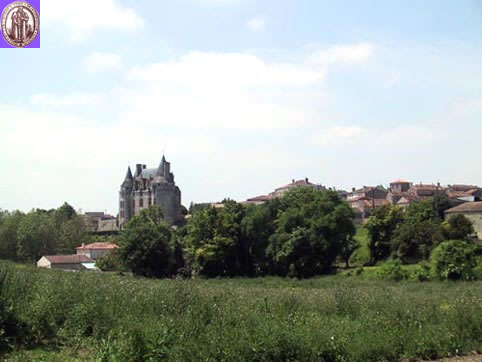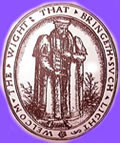THE BATTLE OF LA
BRÉCHOIRE
Chapter the First
In April of that pivotal year 1432, with Henry VI of England finally crowned in Paris and the ashes of Joan of Arc still smouldering in Rouen, the fields around La Bréchoire were the site of a skirmish between a small force led by the great John of Lancaster, Duke of Bedford and glorious victor of Verneuil, and a raggle-taggle army under the Guernsey-born soldier of fortune, Philippe-Raymond de Machon.
Exactly what the Regent was doing in this part of France so soon after the death of his beloved wife, Anne of Burgundy, has never been satisfactorily established. Indeed some authorities still maintain that he was, albeit briefly, in England at this time. We now know that he did not in fact return to Westminster with young King Henry. He stayed on because he was engaged in a mission of the highest importance, accompanied by Edmund Beaufort, Earl of Mortain and uncle of the heir to the Scottish throne - probably the richest young man in England. The party also included Bedford's chamberlain, Richard Woodville the Younger, the young Thomas Malory (the 'Ill-formed'), famous to future generations as the author of Le Morte Darthur, his mentor Richard Beauchamp, Earl of Warwick and governor of Paris, the most brilliant musician of the age, John Dunstaple (pace Dufay), and the mysterious Portuguese physician known as Rolandus Scriptoris. This much we know, through a letter recently uncovered in the Norfolk county library written by William Paston ('William I') to his wife Agnes dated 15 May 1432. (Paston may have heard the details of the incident from the veteran of Agincourt, Sir John Fastolf, whose home was in Caister, near Yarmouth.)
Another member of this noble party, about whom we have surprisingly detailed knowledge, thanks to the tireless efforts of the Yorkshire Historical Society, was the lutenist Robert de Ainslie (or Ainsley or Anesley). The first mention of a de Ainslie comes in an account of manorial rentals for the village of Feribye (now Ferriby, near Hull, East Yorkshire) in Beverley wapontake as a wait, or community musician in 1425. This suggests that he was in his first year of independent service, and hence about 17 or 18 years of age. A 'Roberte de Ainslie' is recorded as a lutemaker and singer in 1431 in Westminster, and accounts from that year show one instrument (probably a theorbo) made for 'Gm. Dufay Ital.'. If this was indeed Guillaume Dufay (c.1400-1474) then Ainslie's reputation must have been high indeed. An accounting ledger of Richard Beauchamp refers to a prize of five florins made to 'luteniste R. d. Anesley' following a banquet in York (?1430) at which he apparently sang and played for several hours. Recent research suggests that Ainsley was in France in 1432, possibly as performer or instrument-keeper.
One is bound to wonder what this distinguished group was doing outside English-controlled territory, and - apparently - heading in the wrong direction.
Henry, now crowned king of both his realms, had returned to England in February with his uncle, Duke Humphrey, Lord Protector of England, Bedford's only surviving brother. One possibility is that Bedford was travelling to Guienne from Nantes, after a meeting with Jean de Malestroit, Bishop of that city, to renew the Treaty of Amiens with Jean V, Duke of Brittany. (The Duke's eight-year-old son Gilles, was despached as ambassador to Westminster the following month, and was indeed brought up with young King Harry himself.) A visit to the Breton court from the most powerful man in France would have been marked by tilting, feasting and the exchange of priceless gifts - although, sadly, no records of this seem to have survived. If Bedford had received presents to bring to King Henry, he would surely have been anxious to get to a port controlled by the English as soon as possible. If so, why was he in the vicinity of La Bréchoire?
Weighed down with magnificent gifts from the wealthy Bretons, he would have been under risk of attack from John, the Bastard of Orleans and the 'Dauphin' Charles VII (who had declared himself King of France at Rheims in 1429), although the presence in England of the prince-poet Charles of Orleans (hostage of the Earl of Suffolk) may have allowed the English party to move freely Through these potentially hostile lands. At any rate, Bedford's entourage would surely have known the position of the Bastard's armies and would have felt relatively secure in the middle of the French countryside. However they were cautious, and they chose a route well away from the coast and the major towns of the region. Unluckily for them, this played into the hands of their ruthless attackers.
 The
Battle Continueth The
Battle Continueth
|


